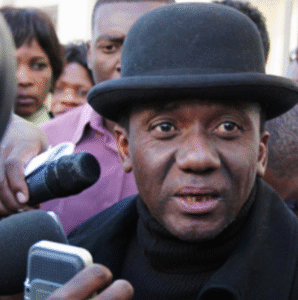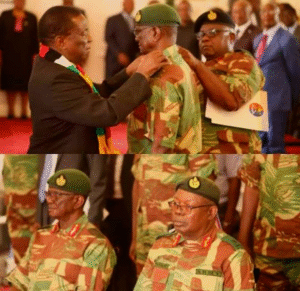CHIWENGA’S CHESS MOVE: TIGHTENING THE GRIP ON ZIMBABWE’S MILITARY MASTERY

In a notable move that could be the precursor to a major shift in Zimbabwe’s political landscape, Vice-President Constantino Chiwenga, a figure with deep military roots and political ambitions, has decisively fortified his control over the military apparatus. This strategic maneuver came into full view as Air Marshal John Jacob Nzvede ascended to the helm of the Air Force of Zimbabwe, succeeding the recently retired Air Marshal Elson Moyo. Nzvede, a key ally of Chiwenga, alongside Zimbabwe National Army (ZNA) commander Lieutenant-General Anselem Sanyatwe, underscores a consolidating circle of military loyalty around the Vice-President.
The installation of Nzvede is not merely a routine military appointment but a significant political chess move. Both Nzvede and Sanyatwe’s involvement in Chiwenga’s recent wedding committee illustrates their close personal and political ties to the Vice-President. This wedding, a union with military intelligence officer Colonel Miniyothabo Baloyi, was not just a personal celebration but a landmark political event, hinting at deeper political strategies and ambitions within Chiwenga’s camp, especially amidst debates over President Emmerson Mnangagwa’s potential third term.
Chiwenga’s strategic positioning within the military and political realms is indicative of a broader campaign to cement his power and influence, particularly at a time when Mnangagwa’s third-term ambitions encounter constitutional and military roadblocks. The inclusion of high-profile military figures in Chiwenga’s wedding, representing various sectors of Zimbabwe’s armed forces, was a bold statement of political alliance and intent.
The political dynamics in Zimbabwe are increasingly being shaped by the military’s influence, a tradition dating back to pivotal moments like the Mgagao Declaration and the November 2017 coup that ushered Mnangagwa into power. However, the recent appointments and maneuvers by Chiwenga suggest a brewing succession battle within the ruling Zanu PF party, gradually intensifying as Mnangagwa eyes an unprecedented third term.
Chiwenga’s consolidation of power within the military, by aligning with key allies, is a clear indication of his ambitions to position himself as a formidable contender for the presidency. This is further complicated by the potential retirement of Zimbabwe Defence Forces (ZDF) commander General Philip Valerio Sibanda, a scenario that could shift the balance of power significantly. Mnangagwa’s attempts to reconfigure the political landscape, including the controversial bid to integrate Sibanda into the Zanu PF politburo, have been met with resistance, revealing the intricate power struggles at play within Zimbabwe’s political elite.
The ongoing tussle between Chiwenga and Mnangagwa represents not just a personal rivalry but a deep-seated conflict over the future direction of Zimbabwe. As Chiwenga tightens his grip on the military, leveraging his network of allies to secure key positions, the stage is set for a confrontation that could redefine Zimbabwe’s political trajectory. With the military’s historical and continued involvement in the country’s politics, the outcome of this power struggle will undoubtedly have profound implications for Zimbabwe’s governance and its people.
As Zimbabwe stands at this crossroads, the international community and Zimbabweans alike watch with bated breath to see how these political maneuvers will unfold. The chessboard is set, and Chiwenga’s next move could very well determine the future of Zimbabwean politics.




